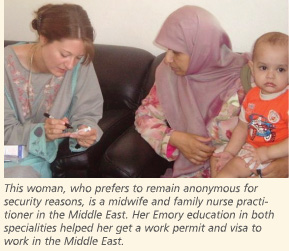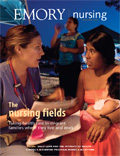A global midwife
|
|
by Kay Torrance
Somewhere in the Middle East, an American midwife is packing up the four-wheel SUV with supplies she’ll need before she heads out on the long drive. She’ll travel outside the main city on unpaved roads for up to an hour to reach a rural clinic by early morning. Once there, she’ll work alongside the clinic’s employees to improve prenatal and primary care.
After graduating from the midwife-family nurse practitioner program at Emory in 2004, she went to work in the Middle East for a nongovernmental organization. (Due to security risks, she asked not to be identified by name or country of work.) She always wanted to work overseas, she says, particularly with an underserved population. This is her second stint in the Middle East. After completing her undergraduate degree, she worked in a small rural hospital and gained experience as a midwife but wanted to become certified.
She didn’t know what to expect when she first arrived in the Middle East, but since then she has come to love the people and culture.
"Arab women are very hospitable, and it is easy to come into their hearts and their homes," she wrote in an email. "That is one of the things I treasure about working here. Everywhere I go people invite me into their homes and into their lives. Life is slower-paced [here], and relationships are highly valued."

She and her colleagues teach the local health care providers how to do a thorough assessment, how to correctly calculate medication dosages for children, and when to refer patients to a more advanced facility in the capital. They take along only basic medications that they know the facility will be able to replenish. Clinics there usually end their day by 2 PM, so the nurses will often talk with people in the community to find out the villagers’ view of the clinics.
The health needs are so great in the area that she finds her education in both specialities has served her well.
"The balance of being a family nurse practitioner and certified nurse midwife been such an asset in the depth and breadth of ways that I can function," she says. "Although most health professionals in this part of the world are unfamiliar with the role of a family nurse practitioner, explaining that I have my master’s degree seems to clarify my role in delivering health care."
She’s been in the Middle East for six years overall, and her contract is set to expire soon. She plans to come back to the United States to catch up on her continuing education requirements before heading out again somewhere. "I could picture myself in this kind of work for the rest of my career," she says.



